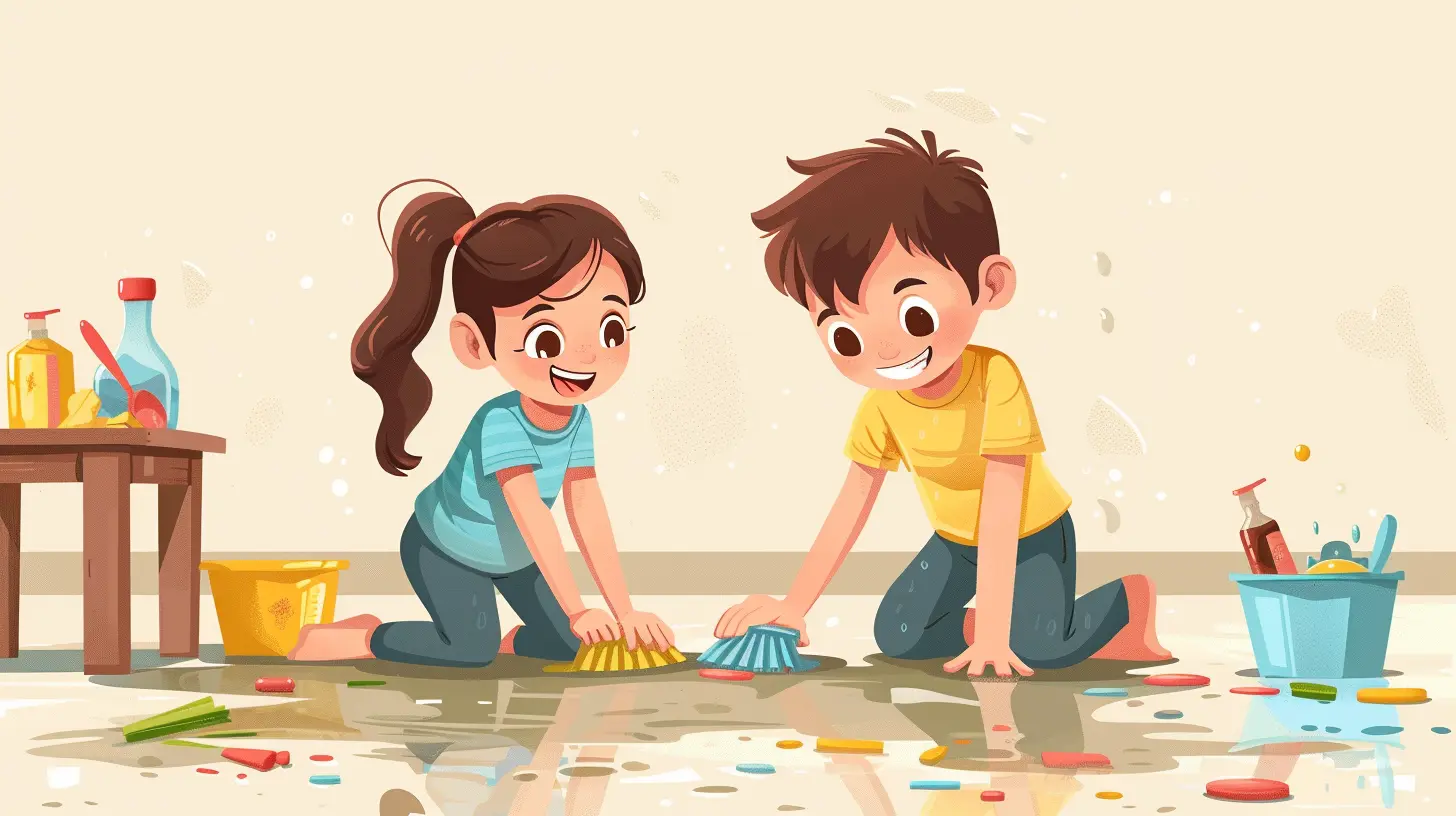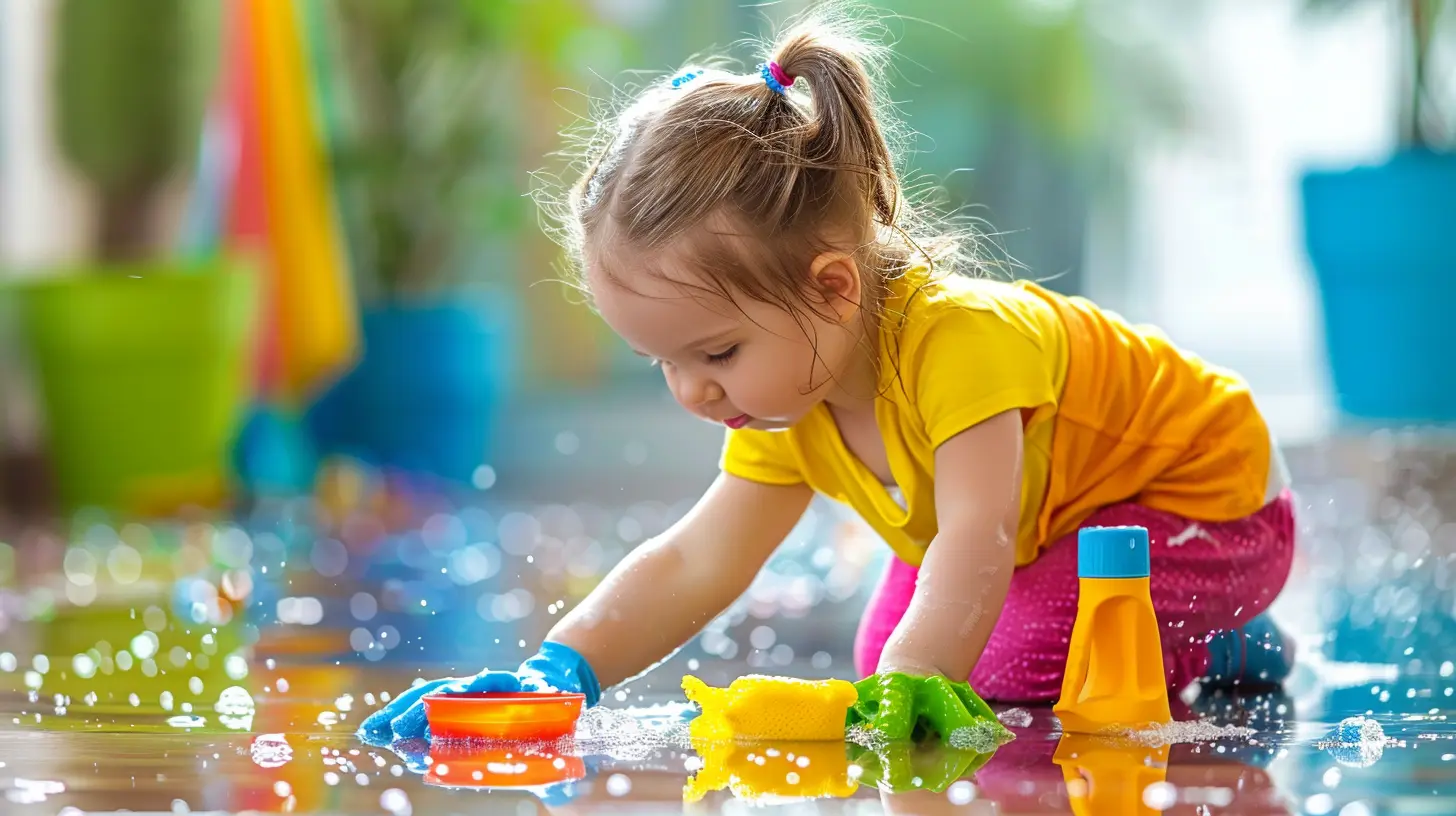16 February 2025
If you’re like most parents, the word "chores" probably doesn’t evoke warm and fuzzy feelings. Instead, it may trigger thoughts of constant reminders, resistance from your kids, and a whole lot of sighing. But what if I told you that those laborious tasks we often dread handing out could be a hidden gem when it comes to developing problem-solving skills in children?
Intrigued? Let’s dive deeper into how chores, though seemingly mundane, can serve as a powerful tool to boost your child’s cognitive abilities and foster resilience.

Why Chores Matter More Than You Think
When we think about chores, we usually focus on their practical benefits—cleaning the house or keeping things organized. But there’s so much more beneath the surface. Assigning chores isn’t just about a cleaner space; it's about creating opportunities for your children to:- Learn responsibility
- Develop independence
- Practice teamwork
- Strengthen problem-solving skills
In many ways, these tasks mimic the real-world problem-solving experiences your kids will face as they grow older. From decision-making and troubleshooting to critical thinking, chores are like little boot camps for the brain.

Chores and Problem-Solving: How Are They Connected?
You might be asking yourself, "Really? How can folding laundry or doing the dishes help my child with problem-solving?" Well, let's break it down.When you think about it, most chores require a sequence of steps and some level of critical thinking. For instance:
- Loading a dishwasher: Your kid needs to figure out the best way to arrange the dishes to maximize space and ensure everything gets clean.
- Tidying up a room: Cleaning up means sorting items into categories, deciding what goes where, and sometimes even thinking about convenience and layout for future use.
- Preparing a simple meal: Cooking involves following instructions, measuring ingredients, and adjusting when things don’t go exactly according to plan.
All of these activities engage the brain in ways that build problem-solving skills. Your child is learning to think critically, evaluate their options, and make quick decisions—all while completing tasks around the house.

The Science Behind It: Cognitive Development Through Chores
It’s not just a theory—there’s actual research to back this up. Studies have shown that children who engage in regular household chores tend to perform better in school and have better problem-solving abilities.[1]Chores help kids develop what psychologists call executive functioning—skills that involve controlling impulses, staying organized, and managing time. When kids participate in chores, they’re forced to think on their feet, plan, and execute tasks.
And it’s not just about academic success. These cognitive skills also play a role in emotional regulation and social interaction. So, while your child is learning to solve practical problems, they’re also honing skills that will help them navigate relationships and handle stress more effectively.

The Hidden Lessons in Everyday Tasks
Ready to take a fresh look at chores? Let’s explore some common household tasks and the hidden problem-solving lessons they offer.1. Laundry: Sorting and Sequencing
Who would’ve thought that sorting laundry could teach math and logic? When your child separates darks from lights, towels from clothing, they're essentially learning basic categorization, a key element in problem-solving and scientific reasoning. Plus, teaching them how to measure the right amount of detergent or choose the proper settings on the washing machine enhances their decision-making abilities.2. Cooking: Following Steps and Adapting
Cooking is an excellent way to introduce your child to sequential problem-solving. Following a recipe requires reading comprehension, precise measuring, and time management—skills they’ll need throughout life. Even better, if something goes wrong (hello, burnt toast), they’re learning how to adapt and troubleshoot.Imagine baking a cake without mixing the ingredients in the correct order: you’d end up with a mess. The same logic applies to solving problems in life—step-by-step, with attention to detail, and a backup plan if things don’t go perfectly.
3. Gardening: Patience and Observation
Gardening teaches kids that not all problems have immediate solutions. Plants take time to grow, and garden maintenance requires ongoing care. Your child will need to observe, plan, and troubleshoot when things go wrong—like adjusting watering schedules if plants start to wilt.This long-term approach to problem-solving is a great way to foster patience in your child, something that’s invaluable in both academics and social settings. They learn that not everything can be fixed immediately, but with careful observation and adjustments, progress will be made.
4. Cleaning: Prioritization and Task Management
Cleaning a house or even just a room isn’t as simple as it seems. It requires prioritizing tasks, deciding what to tackle first, and managing time. Should the dishes be washed before the floor is mopped? Is it more efficient to tidy up toys before trying to vacuum?These decisions require critical thinking and strategy—key elements in problem-solving. Your child learns how to map out a plan, manage distractions, and stay focused on completing the task, all while moving between different challenges.
Encouraging Independence and Resilience
The beauty of using chores to develop problem-solving skills is that it allows kids to experience independence while learning from mistakes.When children are given the autonomy to complete tasks on their own (even if it means they don’t fold the towels perfectly), they’re learning how to tackle problems without constant parental intervention. This trial-and-error process builds resilience.
When something doesn’t go as planned—say the vacuum suddenly stops working halfway through cleaning—it’s an opportunity to troubleshoot. Maybe there’s something stuck in the roller, or perhaps the filter needs cleaning. Rather than swooping in to fix it yourself, encourage your child to think through the issue. Ask questions like:
- "What do you think the problem is?"
- "What could we try to fix it?"
- "What can we do differently next time?"
You’re not only helping them learn perseverance, but also fostering an environment where mistakes are seen as learning opportunities rather than failures.
Age-Appropriate Chores and Problem-Solving
Every age comes with new challenges and problem-solving opportunities. The chores you assign should evolve as your child grows, keeping them engaged and encouraging new skills.Toddlers (Ages 2–4)
At this age, basic sorting tasks—like putting toys in designated bins—and helping with simple tasks like wiping small surfaces can introduce early problem-solving skills. They’re learning to follow directions, stay focused, and classify objects.Young Children (Ages 5–7)
Kids in this age group can handle more complex tasks, such as pairing socks, loading a dishwasher, or setting the table. These chores encourage spatial reasoning and pattern recognition.Pre-Teens (Ages 8–12)
As kids grow older, they can take on responsibilities like cooking simple meals, helping with grocery shopping, or doing laundry. These tasks introduce elements of budgeting, time management, and troubleshooting.Teenagers (Ages 13+)
Teenagers can take on more comprehensive home maintenance tasks, like mowing the lawn, repairing household items, or planning meals for the week. These chores encourage planning, project management, and decision-making—skills that translate well into their future, whether in school, work, or social interactions.Gamifying Chores: Making Problem-Solving Fun
Let’s face it: getting your kids to do chores can sometimes feel like a Herculean task. If resistance is high, why not gamify the experience? By turning chores into a game, you can make the process of developing problem-solving skills even more enjoyable.Some ideas include:
- Time Challenges: Can your child tidy up their toys before a song ends?
- Treasure Hunt: Create a scavenger hunt where they have to find misplaced items and return them to the correct place.
- Point System: Award points for each chore completed, with bonus points for solving household problems (e.g., unclogging a sink).
Not only does this add an element of fun, but it also taps into their competitive spirit, encouraging them to think creatively to complete tasks.
Wrapping It Up: Chores as Life Skills
It’s time to see chores for what they really are—not just tasks to get things done around the house, but a window into teaching your child essential life skills. Problem-solving isn’t just something your child learns in school; it’s something they can develop at home, every time they load a dishwasher, fold laundry, or mow the lawn.Each chore is an opportunity for them to flex their analytical muscles, build resilience, and develop a toolkit of strategies for navigating life’s challenges. So the next time you hear that grumble when you ask them to take out the trash, take heart—you’re not just assigning a task, but equipping them with lifelong skills.








Callista Mathews
This article highlights the invaluable role of chores in fostering problem-solving skills in children. By integrating responsibility into daily routines, we empower kids to think critically and build resilience for future challenges.
April 2, 2025 at 4:36 PM